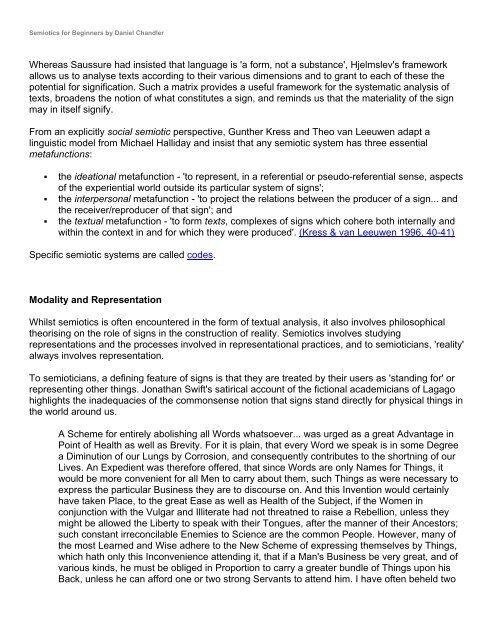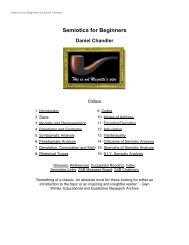Semiotics for Beginners by Daniel Chandler
Semiotics for Beginners by Daniel Chandler
Semiotics for Beginners by Daniel Chandler
Create successful ePaper yourself
Turn your PDF publications into a flip-book with our unique Google optimized e-Paper software.
<strong>Semiotics</strong> <strong>for</strong> <strong>Beginners</strong> <strong>by</strong> <strong>Daniel</strong> <strong>Chandler</strong><br />
Whereas Saussure had insisted that language is 'a <strong>for</strong>m, not a substance', Hjelmslev's framework<br />
allows us to analyse texts according to their various dimensions and to grant to each of these the<br />
potential <strong>for</strong> signification. Such a matrix provides a useful framework <strong>for</strong> the systematic analysis of<br />
texts, broadens the notion of what constitutes a sign, and reminds us that the materiality of the sign<br />
may in itself signify.<br />
From an explicitly social semiotic perspective, Gunther Kress and Theo van Leeuwen adapt a<br />
linguistic model from Michael Halliday and insist that any semiotic system has three essential<br />
metafunctions:<br />
� the ideational metafunction - 'to represent, in a referential or pseudo-referential sense, aspects<br />
of the experiential world outside its particular system of signs';<br />
� the interpersonal metafunction - 'to project the relations between the producer of a sign... and<br />
the receiver/reproducer of that sign'; and<br />
� the textual metafunction - 'to <strong>for</strong>m texts, complexes of signs which cohere both internally and<br />
within the context in and <strong>for</strong> which they were produced'. (Kress & van Leeuwen 1996, 40-41)<br />
Specific semiotic systems are called codes.<br />
Modality and Representation<br />
Whilst semiotics is often encountered in the <strong>for</strong>m of textual analysis, it also involves philosophical<br />
theorising on the role of signs in the construction of reality. <strong>Semiotics</strong> involves studying<br />
representations and the processes involved in representational practices, and to semioticians, 'reality'<br />
always involves representation.<br />
To semioticians, a defining feature of signs is that they are treated <strong>by</strong> their users as 'standing <strong>for</strong>' or<br />
representing other things. Jonathan Swift's satirical account of the fictional academicians of Lagago<br />
highlights the inadequacies of the commonsense notion that signs stand directly <strong>for</strong> physical things in<br />
the world around us.<br />
A Scheme <strong>for</strong> entirely abolishing all Words whatsoever... was urged as a great Advantage in<br />
Point of Health as well as Brevity. For it is plain, that every Word we speak is in some Degree<br />
a Diminution of our Lungs <strong>by</strong> Corrosion, and consequently contributes to the shortning of our<br />
Lives. An Expedient was there<strong>for</strong>e offered, that since Words are only Names <strong>for</strong> Things, it<br />
would be more convenient <strong>for</strong> all Men to carry about them, such Things as were necessary to<br />
express the particular Business they are to discourse on. And this Invention would certainly<br />
have taken Place, to the great Ease as well as Health of the Subject, if the Women in<br />
conjunction with the Vulgar and Illiterate had not threatned to raise a Rebellion, unless they<br />
might be allowed the Liberty to speak with their Tongues, after the manner of their Ancestors;<br />
such constant irreconcilable Enemies to Science are the common People. However, many of<br />
the most Learned and Wise adhere to the New Scheme of expressing themselves <strong>by</strong> Things,<br />
which hath only this Inconvenience attending it, that if a Man's Business be very great, and of<br />
various kinds, he must be obliged in Proportion to carry a greater bundle of Things upon his<br />
Back, unless he can af<strong>for</strong>d one or two strong Servants to attend him. I have often beheld two




